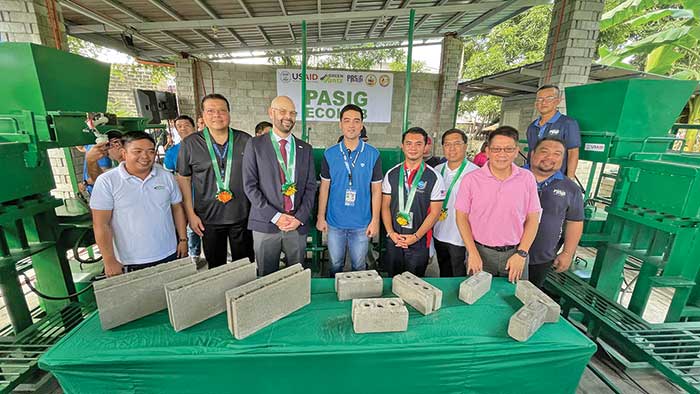On November 14, the United States government, through the U.S. Agency for International Development (USAID) and eco-solutions company Green Antz Builders, Inc., unveiled a Php14-million ($248,000) modern recycling facility in Pasig City as part of its commitment to fighting ocean plastic pollution.
“Finding solutions to the challenge of ocean plastic pollution requires innovation, creativity, and the strong commitment of government, private sector, and community partners,” USAID Environment Office Director Ryder Rogers said. “As your partner in prosperity, the U.S. government stands with you all in building an inclusive economy and exploring innovative solutions to achieving cleaner oceans.”
Located in Barangay Manggahan, the modern recycling facility—also called a Community EcoHub—allows on-site waste collection and composting of up to one ton of organic waste per day. It can also upcycle low-value plastic waste, such as sachets and plastic bags, into durable eco-bricks and pavers suitable for constructing homes and other structures. Through its Clean Cities, Blue Ocean (CCBO) program, USAID was able to provide Green Antz Builders, Inc. with waste collection electronic vehicles and equipment.
“We have built more than 20 EcoHubs with private partners over the years, but our goal for this Community EcoHub is to establish an effective waste management program that can be adapted and replicated by other local governments,” said Rommel Benig, CEO and founder of Green Antz Builders, Inc.
In the long term, the Pasig City government will take over the operation of the recycling facility, reinforcing its sustainability and impact on the city’s solid waste management and economy. In his remarks, Pasig City Mayor Vico Sotto said that the Community EcoHub supports his local government’s goal of promoting sustainable solutions to environmental challenges.
Launched in 2019, USAID’s five-year, CCBO program addresses the crisis of ocean plastics pollution in rapidly urbanizing countries. In the Philippines, USAID has awarded around Php150 million ($2.7 million) to several organizations to implement programs that improve plastic waste collection, reduction, and recycling.























